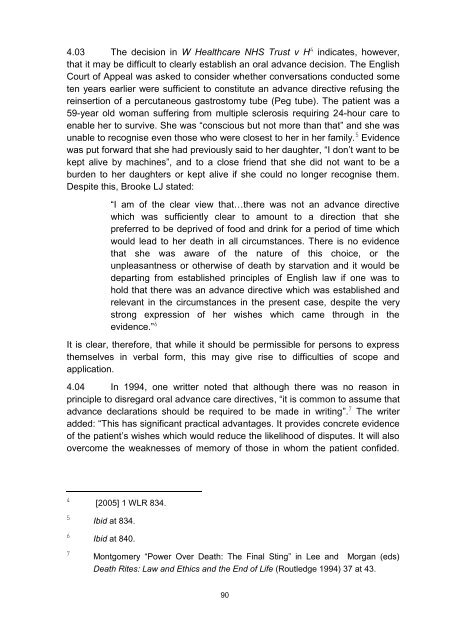Consultation Paper on Bioethics - Law Reform Commission
Consultation Paper on Bioethics - Law Reform Commission
Consultation Paper on Bioethics - Law Reform Commission
You also want an ePaper? Increase the reach of your titles
YUMPU automatically turns print PDFs into web optimized ePapers that Google loves.
4.03 The decisi<strong>on</strong> in W Healthcare NHS Trust v H 4 indicates, however,<br />
that it may be difficult to clearly establish an oral advance decisi<strong>on</strong>. The English<br />
Court of Appeal was asked to c<strong>on</strong>sider whether c<strong>on</strong>versati<strong>on</strong>s c<strong>on</strong>ducted some<br />
ten years earlier were sufficient to c<strong>on</strong>stitute an advance directive refusing the<br />
reinserti<strong>on</strong> of a percutaneous gastrostomy tube (Peg tube). The patient was a<br />
59-year old woman suffering from multiple sclerosis requiring 24-hour care to<br />
enable her to survive. She was “c<strong>on</strong>scious but not more than that” and she was<br />
unable to recognise even those who were closest to her in her family. 5 Evidence<br />
was put forward that she had previously said to her daughter, “I d<strong>on</strong>‟t want to be<br />
kept alive by machines”, and to a close friend that she did not want to be a<br />
burden to her daughters or kept alive if she could no l<strong>on</strong>ger recognise them.<br />
Despite this, Brooke LJ stated:<br />
“I am of the clear view that…there was not an advance directive<br />
which was sufficiently clear to amount to a directi<strong>on</strong> that she<br />
preferred to be deprived of food and drink for a period of time which<br />
would lead to her death in all circumstances. There is no evidence<br />
that she was aware of the nature of this choice, or the<br />
unpleasantness or otherwise of death by starvati<strong>on</strong> and it would be<br />
departing from established principles of English law if <strong>on</strong>e was to<br />
hold that there was an advance directive which was established and<br />
relevant in the circumstances in the present case, despite the very<br />
str<strong>on</strong>g expressi<strong>on</strong> of her wishes which came through in the<br />
evidence.” 6<br />
It is clear, therefore, that while it should be permissible for pers<strong>on</strong>s to express<br />
themselves in verbal form, this may give rise to difficulties of scope and<br />
applicati<strong>on</strong>.<br />
4.04 In 1994, <strong>on</strong>e writter noted that although there was no reas<strong>on</strong> in<br />
principle to disregard oral advance care directives, “it is comm<strong>on</strong> to assume that<br />
advance declarati<strong>on</strong>s should be required to be made in writing”. 7 The writer<br />
added: “This has significant practical advantages. It provides c<strong>on</strong>crete evidence<br />
of the patient‟s wishes which would reduce the likelihood of disputes. It will also<br />
overcome the weaknesses of memory of those in whom the patient c<strong>on</strong>fided.<br />
4 [2005] 1 WLR 834.<br />
5 Ibid at 834.<br />
6 Ibid at 840.<br />
7 M<strong>on</strong>tgomery “Power Over Death: The Final Sting” in Lee and Morgan (eds)<br />
Death Rites: <strong>Law</strong> and Ethics and the End of Life (Routledge 1994) 37 at 43.<br />
90

















